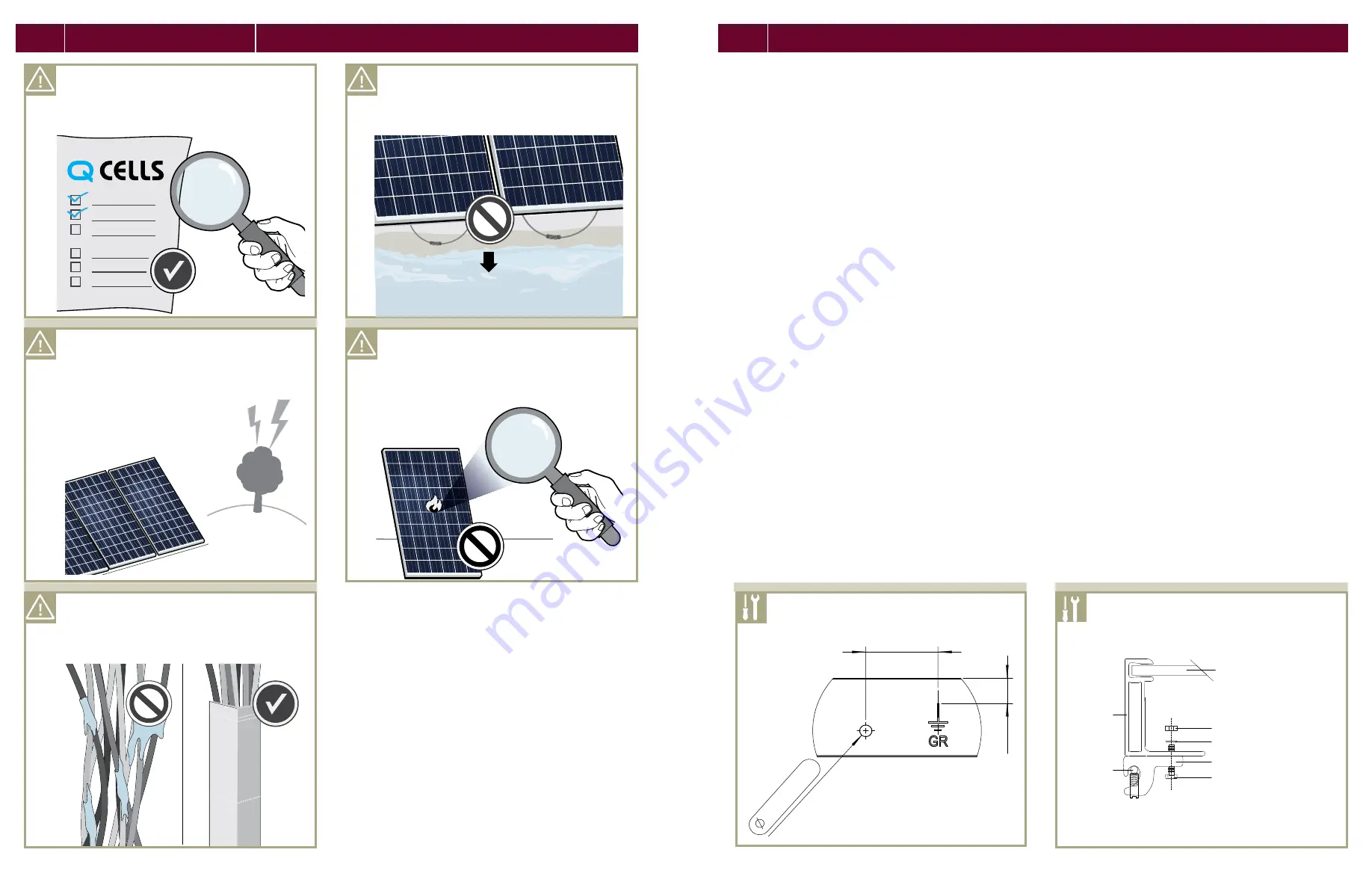
19
INSTALLATIoN AND oPErATIoN MANUAL SoLAr MoDULES GENErATIoN 4 (G4) – HANwHA Q CELLS GMBH – NA
18
INSTALLATIoN AND oPErATIoN MANUAL SoLAr MoDULES GENErATIoN 4 (G4) – HANwHA Q CELLS GMBH – NA
Ä
Ensure that all necessary safety and functional
tests have been carried out according to current
industry standards.
NOTE
! Module damage may occur!
Ä
Ensure that the plug connections are not level with
a water-channeling surface.
Ä
Integrate the system into the existing lightening
protection system in accordance with the
applicable local regulations.
WARNING
! Fire Risk!
Ä
Do not use light concentrators (e.g. mirrors or
lenses).
Ä
Ensure that the cabling is not exposed and/
or hanging and is protected from dirt and
moisture.
4.4 After installation
4
ELECTrICAL CoNNECTIoN
5 GroUNDING
Functional grounding
•
When using an installation tilt of < 5° a functional grounding at
the negative generator conncetion must be implemented.
Ä
Ensure that the difference of potential between the negative
generator connection and the PE(N) of every MPP tracker of the
respective inverters is 0 V.
Ä
Follow the directions of the inverter manufacturer.
Ä
Only use inverters which include lincensed grounding kits.
Protective Grounding
In order to prevent electrical shock or fire, the frame of the module
as well as any non-current-carrying metal parts of the system must
be grounded. While this section provides some information about
grounding the Q CELLS frames and modules, reference should be
made to local statutes and regulations for specific requirements
on grounding. The U.S. National Electrical Code addresses these
issues in Article 250.
Proper grounding is achieved by bonding all exposed non-current-
carrying metal equipment to the appropriately sized equipment
grounding conductor (EGC) or racking system that can be used for
integrated grounding.
Q CELLS frames are protected from corrosion with an anodized
coating, which has to be penetrated in order to ensure proper
bonding. The different methods listed below are suggested
methods for an appropriate bond between the frame and the EGC
or racking system (that will have to be properly grounded). The
method appropriate for any individual installation will depend on
multiple factors.
option A: Use of a grounding lug
A listed grounding lug can be bonded to the frame using the
grounding holes pre-drilled in the frame. These holes are marked
•
Dimensions shown are in inches.
0.177” (+0.008/-0)
±0.08
0.79”
0.47”
±0.08
PV Laminate
Backing Nut (Stainless Steel)
Toothed Lock Washer (Stainless Steel
or tin-plated metal)
Grounding Lug (Stainless Steel)
Equipment
Grounding
Conductor
Aluminum
Frame
Screw (Stainless Steel)
with a ground symbol, as shown below on the frame section drawing:
To install the grounding lug, follow the specified instructions of
the manufacturer. The grounding lug should be made of stainless
steel or tin plated metals such as aluminum to avoid corrosion. The
grounding lug should be attached to the frame grounding hole using
a stainless steel screw, toothed lock washer or KEPS nut (in order
to penetrate the anodized layer) and backing nut. Care should be
taken to avoid the use of grounding hardware of dissimilar metals,
which may lead to corrosion
option B: Integrated grounding methods
The Q CELLS modules can be bonded with the racking
system using UL1703 or UL2703 certified integrated
grounding methods. The racking system will then have to be
grounded so that the overall system is properly grounded.
The listed racking system and grounding device should be
installed in accordance with the manufacturers’ instructions.
An example of such integrated grounding method is the use
of a WEEB clip or Schletter plate between the module and the
racking system, when mounting the module. The WEEB washers
are generally compatible with Q CELLS modules, however each
combination module / racking system requires a specific WEEB
washer size. Note that WEEB clips are intended for single use only;
they must not be reused after removal or loosening. Refer to Wiley’s
installation instructions for the specific use of WEEB washers.
An example of such integrated grounding method is the use of a
washer recognized as meeting UL2703 requirements between the
module and the racking system, when mounting the module. For
example, WEEB washers are generally compatible with Q CELLS
modules, however each combination module / racking system
requires a specific WEEB washer size. Note that WEEB washers
are intended for single use only; they must not be reused after
removal or loosening. Refer to Wiley’s installation instructions for
the specific use of WEEB washers.






























